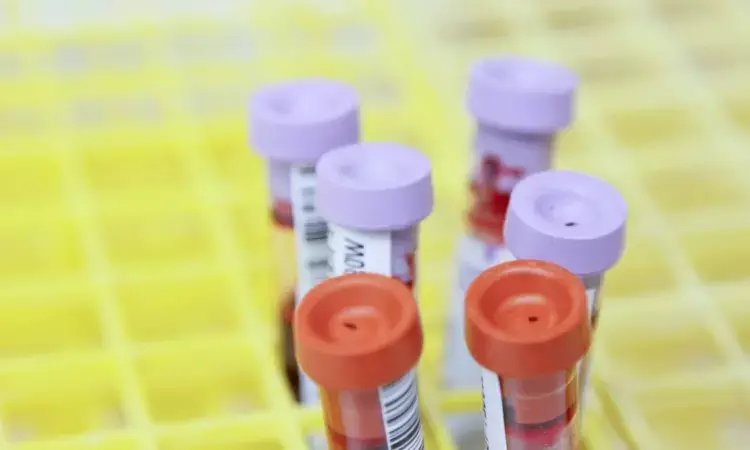- Home
- Medical news & Guidelines
- Anesthesiology
- Cardiology and CTVS
- Critical Care
- Dentistry
- Dermatology
- Diabetes and Endocrinology
- ENT
- Gastroenterology
- Medicine
- Nephrology
- Neurology
- Obstretics-Gynaecology
- Oncology
- Ophthalmology
- Orthopaedics
- Pediatrics-Neonatology
- Psychiatry
- Pulmonology
- Radiology
- Surgery
- Urology
- Laboratory Medicine
- Diet
- Nursing
- Paramedical
- Physiotherapy
- Health news
- Fact Check
- Bone Health Fact Check
- Brain Health Fact Check
- Cancer Related Fact Check
- Child Care Fact Check
- Dental and oral health fact check
- Diabetes and metabolic health fact check
- Diet and Nutrition Fact Check
- Eye and ENT Care Fact Check
- Fitness fact check
- Gut health fact check
- Heart health fact check
- Kidney health fact check
- Medical education fact check
- Men's health fact check
- Respiratory fact check
- Skin and hair care fact check
- Vaccine and Immunization fact check
- Women's health fact check
- AYUSH
- State News
- Andaman and Nicobar Islands
- Andhra Pradesh
- Arunachal Pradesh
- Assam
- Bihar
- Chandigarh
- Chattisgarh
- Dadra and Nagar Haveli
- Daman and Diu
- Delhi
- Goa
- Gujarat
- Haryana
- Himachal Pradesh
- Jammu & Kashmir
- Jharkhand
- Karnataka
- Kerala
- Ladakh
- Lakshadweep
- Madhya Pradesh
- Maharashtra
- Manipur
- Meghalaya
- Mizoram
- Nagaland
- Odisha
- Puducherry
- Punjab
- Rajasthan
- Sikkim
- Tamil Nadu
- Telangana
- Tripura
- Uttar Pradesh
- Uttrakhand
- West Bengal
- Medical Education
- Industry
Clonal hematopoiesis risk score associated mortality risk in older adults with clonal hematopoiesis: JAMA

USA: A recent study published in JAMA Network Open has suggested an association of clonal hematopoiesis (CH) risk score with overall and disease-specific mortality in older adults with CH. Thus, the CH risk score (CHRS) could be used to identify patients with CH who require more intensive surveillance.
The cohort study included 3871 individuals without hematologic malignant neoplasms at baseline, 24.2% had clonal hematopoiesis. The survival of individuals with low-risk CH (59.9% of those with CH) was similar to those without CH, and participants with high-risk CH (6.2% of those with CH) had increased cardiovascular, all-cause, and hematologic malignant neoplasm–related mortality.
With age, clonal hematopoiesis becomes increasingly common. A subset of CH caused by acquired leukemogenic variants is called clonal cytopenia of undetermined significance (CCUS), or CH of indeterminate potential (CHIP), according to the presence or absence of cytopenia. Initially, CCUS/CHIP was described as a risk factor for hematologic (particularly myeloid) malignant neoplasms (HMs). Several studies have demonstrated increased mortality and increased risk of cardiovascular disease, largely among middle-aged adults. However, the predictive value of CCUS/CHIP in the older population is understudied.
Recently, the CH risk score -- a prognostic tool that uses complete blood cell count parameters, demographic variables, and molecular features— was developed to estimate myeloid malignant neoplasms risk in CHIP/CCUS patients. Seyedmohammad Saadatagah, Department of Medicine, Baylor College of Medicine, Houston, Texas, and colleagues aimed to examine the prognostic value of CCUS/CHIP in a cohort of older adults (aged ≥65 years) and determine the use of CHRS in estimating disease-specific and overall mortality.
The study included community-dwelling older adults (aged 67-90 years) without hematologic malignant neoplasms who participated in the Atherosclerosis Risk in Communities Visit 5 at 4 US centres. Samples collection was done from 2011 to 2013, sequencing was performed in 2022t, and data analysis was completed in 2023.
The exposure was CH diagnosis, CHRS scores (calculated using eight demographic, molecular factors, and complete cell count) were used to categorize patients with CH into low-risk (CHRS ≤9.5), intermediate-risk (CHRS >9.5 to <12.5), and high-risk (CHRS ≥12.5) groups.
The study's primary outcome was all-cause mortality, and secondary outcomes included cardiovascular disease mortality and mortality from other causes.
Based on the study, the following inferences were made:
- Among 3871 participants without a history of HM (mean age, 75.7 years; 58.5% were females), 24.2% had CH.
- According to the CHRS, 59.9% were low risk, 33.9% were intermediate risk, and 6.2% were high risk.
- During a median follow-up of 7.13 years, 19.4% of participants without CH and 27.1% of participants with CH died.
- Mortality by CHRS risk group was 22.8% deaths for low risk, 29.2% for intermediate risk, and 56.9% for high risk.
- Using multivariable competing risk regression, subdistribution hazard ratios (sHRs) for all-cause mortality were 1.08 for low-risk CH, 1.12 for intermediate-risk CH, and 2.52 for high-risk CH compared with no CH.
- Among individuals in the high-risk CH group, the sHR of death from HM (10.3% deaths) was 25.58, and that of cardiovascular death (20.7% deaths) was 2.91.
"The findings showed that CHRS was associated with HM-related, all-cause, and cardiovascular disease mortality in older adults with CH," the researchers wrote, "and may be useful in shared decision-making to guide clinical management and identify appropriate candidates for clinical trials."
Reference:
Saadatagah S, Uddin MM, Weeks LD, et al. Clonal Hematopoiesis Risk Score and All-Cause and Cardiovascular Mortality in Older Adults. JAMA Netw Open. 2024;7(1):e2351927. doi:10.1001/jamanetworkopen.2023.51927
Dr Kamal Kant Kohli-MBBS, DTCD- a chest specialist with more than 30 years of practice and a flair for writing clinical articles, Dr Kamal Kant Kohli joined Medical Dialogues as a Chief Editor of Medical News. Besides writing articles, as an editor, he proofreads and verifies all the medical content published on Medical Dialogues including those coming from journals, studies,medical conferences,guidelines etc. Email: drkohli@medicaldialogues.in. Contact no. 011-43720751


